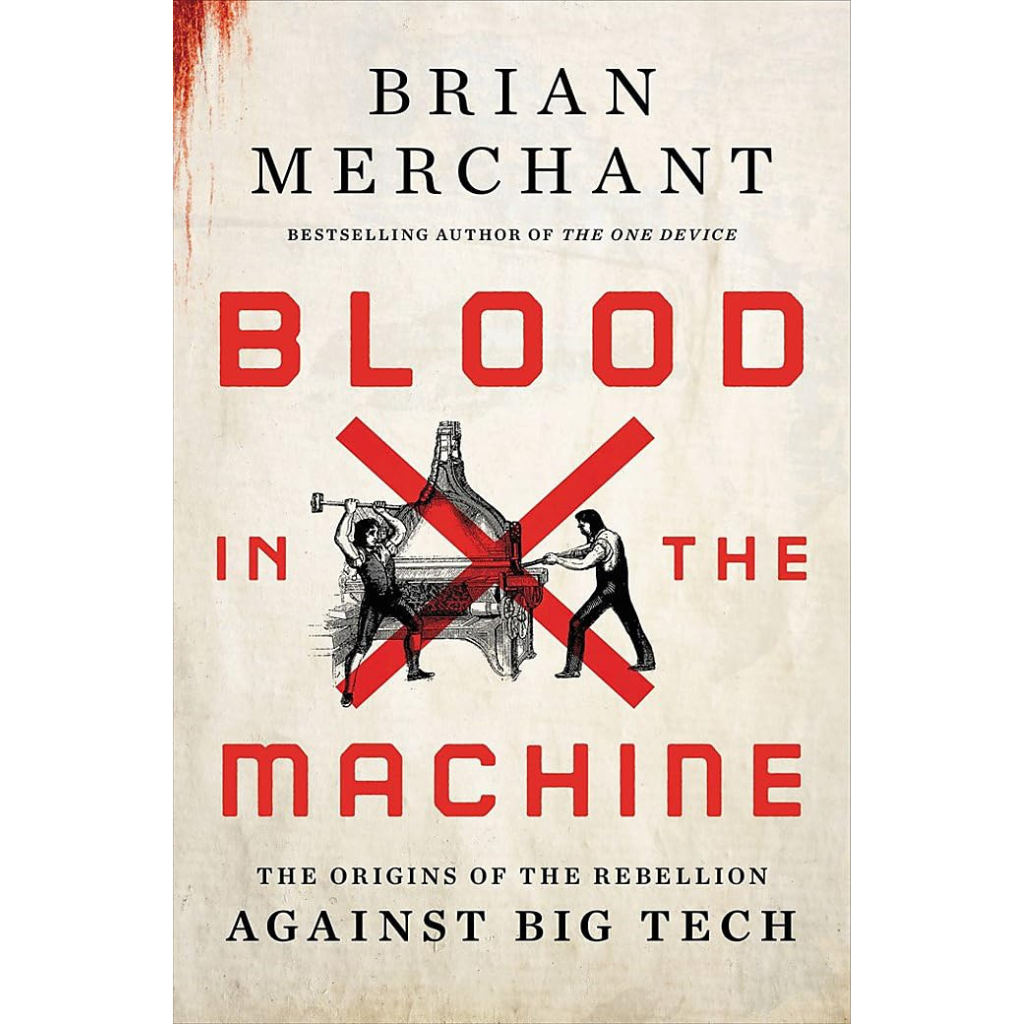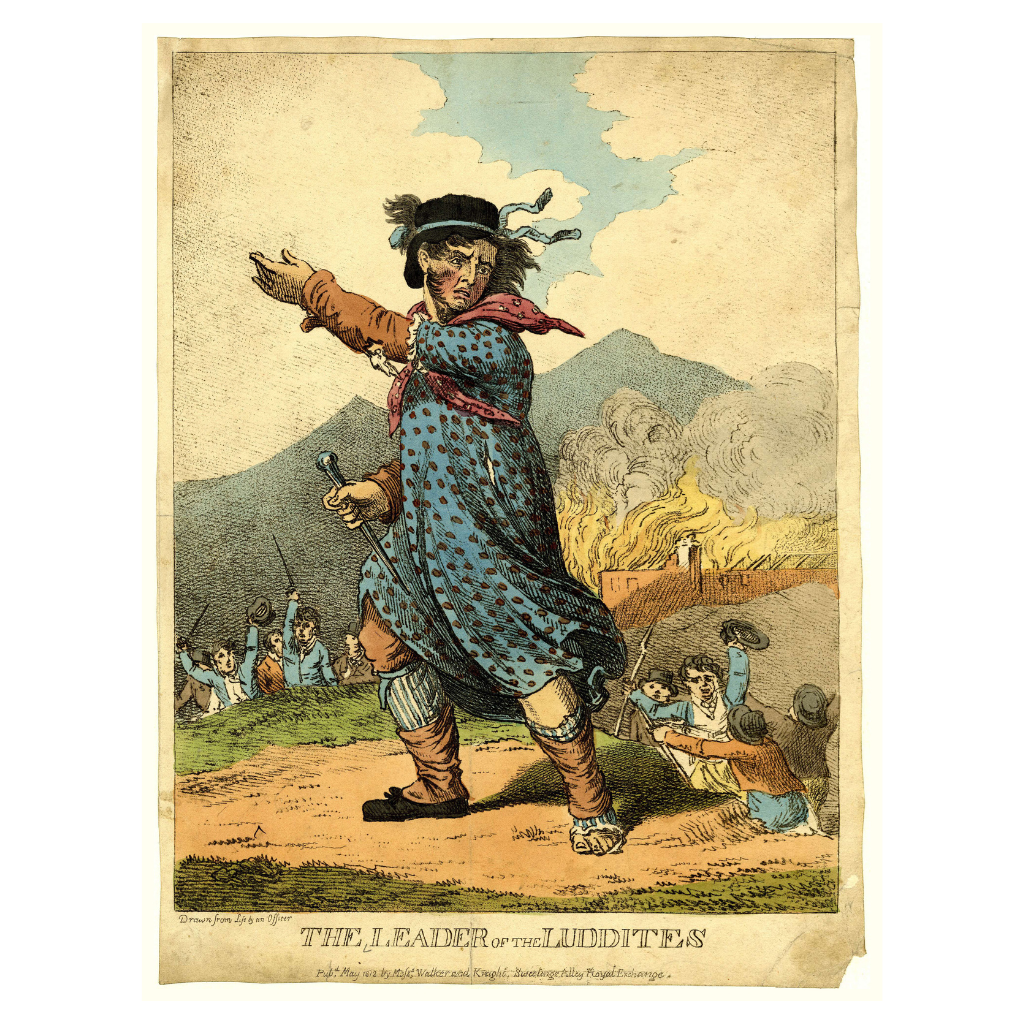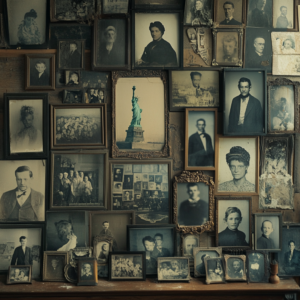
Click here to get Blood in the Machine by Brian Merchant
…and see free option with Audible trial
Who Were the Luddites, and Why Are They Misunderstood?
When you hear “Luddite,” do you picture someone smashing a computer or refusing to upgrade their phone? If so, you’re not alone, but that’s a huge misunderstanding. The Luddites were skilled textile workers in early 19th-century England, and their protests weren’t about hating technology—they were about fighting for their livelihoods. They saw new machinery being used not to make their lives better but to cut corners, replace skilled workers with cheaper, less experienced labor (including children), and exploit people under the new factory system.
What Did the Luddites Really Fight Against?
The Luddites were actually fine with technology—if it helped them do their jobs better. Their anger wasn’t directed at machines themselves but at how those machines were being used. Employers replaced artisans with lower-paid, less skilled workers, which destabilized communities and left many skilled laborers in poverty.
Take, for instance, the introduction of power looms in textile factories. These machines allowed manufacturers to produce fabric faster and cheaper, but they also displaced weavers who had spent years honing their craft. The weavers’ protests weren’t born of stubbornness or nostalgia but from the stark reality that their livelihoods were under threat. Without their skilled labor, entire communities that depended on weaving collapsed.
What made the Luddites unique was their targeted protests. They didn’t go on a random smashing spree. They focused on factories they believed were exploiting workers, often warning owners to change their practices before taking action. Their protests were as much a political statement as an economic one—a way to fight the growing imbalance of power brought on by the Industrial Revolution.
How Are the Luddites Relevant Today?
Fast forward two centuries, and journalist Brian Merchant makes a compelling argument in Blood in the Machine that we’re seeing history repeat itself with AI and automation. Just like the machines of the Industrial Revolution, today’s AI is shaking up industries—and not always in a good way.
How Does AI Impact Today’s Workforce?
Let’s talk specifics. AI isn’t just about chatbots and clever algorithms—it’s becoming a disruptive force in several industries:
- Art and Creativity: You’ve probably seen AI-generated art or read about AI writing tools. While these technologies are remarkable, they rely on training data pulled from the works of real artists and writers—often without permission or compensation. For example, an artist may spend years perfecting their style, only to have it mimicked by an algorithm trained on their work. This raises serious concerns about intellectual property and the value of human creativity.
- Transportation: Think self-driving trucks and delivery robots. These innovations promise efficiency but at a steep cost. Truck driving is one of the most common jobs in many countries, employing millions. What happens to these workers when automation replaces them? It’s not just about job loss; it’s about the ripple effect on families and communities reliant on those jobs.
- Entertainment: AI is being used to generate scripts, music, and even digital performances. Consider the growing use of AI to recreate actors’ voices or likenesses. While it might sound futuristic, it threatens to sideline human performers and creators, reducing their contributions to mere inputs for a machine.
Just like in the Luddites’ time, these changes aren’t inherently bad—but when they’re used to prioritize profits over people, we end up in familiar territory: exploitation disguised as progress.
Why Did the Myth of Ned Ludd Matter?
Now, let’s talk about Ned Ludd, the mythical figurehead of the Luddites. The story goes that he was an apprentice who destroyed a knitting machine in a fit of rage. It’s almost certainly not true, but the story stuck, and the Luddites turned him into a symbol of their movement.
What Role Did Ned Ludd Play in the Movement?
Ned Ludd became a rallying point—a figure who embodied their resistance to oppression. By adopting his name, the Luddites gave their cause a unifying identity. It wasn’t just about a name; it was about creating a story that could inspire and unify people who felt powerless against the sweeping changes of the Industrial Revolution.
This symbolic power is something we still see today. Think of modern movements rallying around figures like Greta Thunberg or the “Anonymous” mask. These symbols galvanize support and create a shared identity, much like Ned Ludd did for the Luddites.
What Lessons Does the Luddites’ Legacy Offer?
The Luddites’ story offers more than a history lesson—it’s a mirror reflecting today’s challenges with technology. They weren’t anti-progress; they were pro-fairness. Their legacy invites us to ask hard questions about how we approach innovation.
What Can the Luddites Teach Us About Technology?
- The “Mechanical Age”: The Industrial Revolution was a double-edged sword. It brought incredible advancements but also massive disruptions, particularly for workers. The same pattern holds true today as AI transforms industries at a breakneck pace.
- The Evolution of Luddism: Over time, the term “Luddite” has unfairly become shorthand for anyone who resists new technology. This oversimplification erases their valid critiques about how technology was being used to centralize power and wealth. In truth, they were early advocates for responsible innovation.
- Critical Engagement with Technology: Here’s the big takeaway: technological advancements should be tools to improve lives, not tools for exploitation. If we’re not questioning who benefits and who loses, we’re missing the point.
For example, AI could revolutionize healthcare by analyzing data to detect diseases earlier. But if those tools are only accessible to the wealthy or if they’re used to cut corners at the expense of patient care, we’ve missed the mark. The Luddites’ story reminds us that progress without fairness isn’t progress at all.
What Is the Bigger Picture?
The Luddites remind us that technological progress isn’t automatically good. It’s all about how we choose to use it. The Industrial Revolution showed us how easily technology can be turned against workers, and today’s AI revolution risks repeating those mistakes. But it doesn’t have to be this way.
Key Takeaways:
- The Luddites Opposed Exploitation, Not Technology: They fought against inequity, not innovation.
- AI and Automation Pose Modern Challenges: Without safeguards, these tools could deepen inequality.
- We Must Stay Critical of Technology: Progress should serve humanity, not just corporate interests.
By revisiting the Luddites, we’re not just dusting off a history book—we’re learning how to navigate our AI-driven future with fairness, humanity, and justice at the forefront.





